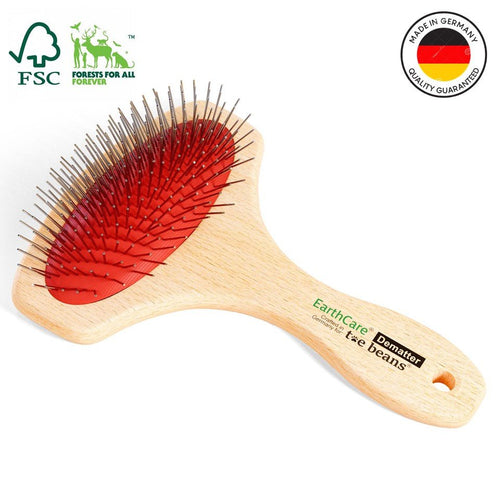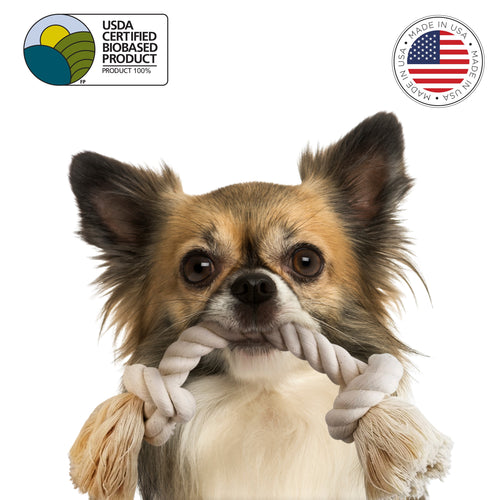Your Cart is Empty
Free 2-5 day delivery | No minimum purchase required
Free 2-5 day delivery | No minimum purchase required
Shop
Learn
What Are the Causes of Puppy Potty Training Regression?
 by K Marie Alto Updated
10 min read
by K Marie Alto Updated
10 min read

One of our first tasks as parents to puppies is potty training them. This training can start as soon as a puppy is in the 8-16-week-old range, and it goes alongside basic socialization, comfort, familiarity, and impulse control training.
They're still babies, so they're still learning how to exist in this wild world of ours, and it's our job to make sure they're set up to succeed as best they can.
Potty training isn't necessarily easy. You need to keep track of their needs and their progress, make sure they aren't suffering from an allergy or dietary sensitivity, and they aren't getting into things they should that lead to accidents.
It also requires you to be very consistent, to make sure your pup knows when you take them to potty, it's for potty, not for play or socialization. While you can potty train a dog of any age, it's easiest and most effective when they're very young.
Sometimes, unfortunately, your pup may regress in their training. If they're still a puppy and they're still in the midst of training, a regression might just mean accidents you need to deal with. If they're an older dog, incontinence can be a greater concern.
So, what can cause potty training regression, and what can you do about it? Let's talk about it.
Table of Contents
- What is Puppy Potty Training Regression?
- Are There Different Kinds of Puppy Potty Training Regression?
- What Are the Different Causes of Puppy Potty Training Regression?
- Regression Due to Overestimation or Overeating
- Regression Due to Medical Issues
- Regression Due to Stress or Anxiety
- Regression Due to Allergies or Sensitivities
- Regression Due to Faulty Training
- Puppy Potty Training Regression FAQ
What is Puppy Potty Training Regression?
Potty training regression generally refers to your puppy having accidents they shouldn't be having. Say, for example, you've been taking your puppy out to potty every couple of hours, but they're getting better at holding it, and you're able to let them go for 4-5 hours at a time instead.
For a few weeks, they've been good, with no indoor accidents, going outside when you bring them outside for it, and all seems well.
Then, out of nowhere, they start having accidents inside again. It's not necessarily even just a single accident, but a series; it seems like you're going to have to go back to every two hours, and the broken sleep once again.

This is potty training regression: a return to an earlier point in the potty training schedule, accidents when there weren't accidents before, and the frustration of seeing things go awry.
Are There Different Kinds of Puppy Potty Training Regression?
While a regression is a regression, the age and level of training of your puppy can mean different things.
If your puppy is regressing when they're around four months old, it's probably the most common kind of regression, which is just progressing training schedules too much, too soon.
We like to think that our puppies are more or less fully potty trained around this age, but that's really just optimistic. Most puppies take a little longer, and a regression at this point is normal.
If your puppy is regressing when they're closer to seven or eight months old, it's also a very common reason: training tends to lighten up. You don't want to have to give your pup a treat every time they go to the bathroom, right?
So, you're probably lightening up on the training and the positive reinforcement, and that can make training regress. Basically, you just have to stick with the training – and the rewards – a little longer.

If your puppy is regressing when they're around 10 or 11 months old, there are a handful of reasons why it might be happening. This is a time when puppies are starting to reach sexual maturity, which causes a lot of changes.
Male puppies are more likely to start marking their territory – which isn't quite the same as an accident – and female puppies are dealing with floods of hormones and distractions.
If your puppy is regressing when they're a year or more older, it's less likely to be a training regression, and more likely to be something like a medical issue. I'll talk more about that in my list of possible causes.
If your dog is much older – into their senior years – and they're having accidents, it's regression in another sense. Sadly, it's a sign of doggy dementia. Again, more on that in a bit.
What Are the Different Causes of Puppy Potty Training Regression?
There are a ton of different reasons why potty training regression can happen. Some of them are behavioral, some of them are reactionary, some of them are medical. Let's talk about them!
Regression Due to Overestimation or Overeating
One of the first – and thankfully, least bad – causes of regression is that your puppy simply can't hold it in any longer. One of two things happens here.
The first is that you've overestimated how long your puppy can hold their bowels, and you're not taking them out as often as they need to go.
Young puppies only have so much ability to control themselves, and when you're training them, your goal is to extend that amount of time. But, just like we people, if they go too long without having the chance to go, they'll experience cramping, pain, and, eventually, involuntary incontinence.
The solution here is simply to keep track of how long they can go without going, and don't push too far, too fast.

The second possibility here is that you've overestimated your puppy's capacity for food and water. When you drink a lot of water, you have to pee a lot sooner than you would if you don't drink much water. You can't deny your puppy food and water, of course, but if they overeat or drink too much, they'll have to go sooner rather than later.
This is particularly common when you're getting them more exercise, playing a lot to tire them out, and then bring them back in and let them drink until they're restored. You'll probably need to take them back out right away, but if you don't think about it, you might not realize that, which leads to an accident, and a regression.
Fortunately, this is just another case of vigilance. You need to pay more attention to the situation and take them out when they need it.
Regression Due to Medical Issues
Another common cause of potty training regressions – and accidents as your puppy gets older – is medical problems.

All sorts of medical problems can cause regressions. Some of the most common include:
- A urinary tract infection, or UTI, which causes irritation and pain as well as a loss of bladder control.
- Diabetes, which is rare in young puppies but can occur due to genetic or congenital factors, and needs to be appropriately managed to prevent incontinence.
- Inflammatory bowel disease, which is a chronic condition characterized by bowels that don't work quite right and get inflamed easily, leading to incontinence and other symptoms.
- Kidney disease, which can be caused by a bunch of different factors, including undetected UTIs, and cause more accidents.
- Medicine side effects. Sometimes if your puppy is on another medication, they can have side effects including incontinence. Your prescribing vet should tell you about it, so you can prepare, and it should alleviate once they're off the medication.
If you're taking your puppy out on a tight schedule and they shouldn't be having issues, but they're still having regressions, you might consider taking them to the vet as soon as you can.
It's not "rush them to the emergency vet" dangerous, but you should still schedule a rapid consultation if you can. UTIs and other infections are no joke, and chronic conditions need to be managed to prevent problems down the line.
In some cases, a simple medication or a change in diet is all you need to solve the regressions. Other times, you may need more long-term treatments.
Regression Due to Stress or Anxiety
Another cause you might consider is significant sources of stress and anxiety.
Some dogs get separation anxiety, which can manifest particularly when you're away at work or you're asleep at night.
Whether it's night crying, accidents, barking, whining, or other behavioral issues, it's a kind of anxiety that needs to be handled before it becomes a huge disruption.

Other times, it might be because of a change in lifestyle or routine. If you recently had to move to a new house, for example, a whole unfamiliar place can be very stressful and can lead to regressions. Similarly, major life changes can do the same.
Similarly, if you're getting another new animal, uncertainty with the new pet might also cause problems. A particularly sensitive puppy might relieve themselves out of submissiveness, or they may be bullied, or they may just be anxious and scared. This usually alleviates with proper socialization.
Regression Due to Allergies or Sensitivities
As you might expect, the cause of incontinence might not actually be a regression in training, but rather, a problem with what your puppy is eating.

Allergies can cause stomach upset, which can lead to diarrhea and incontinence. Sensitivities are the same, but are broadly less dangerous.
A sensitivity can be disruptive to the digestive system and is definitely unpleasant, but an allergy can be both very damaging to their systems and even, in some cases, fatal.
If you've switched to a new food or a new treat recently and regressions have started happening, check to see if there's an ingredient your puppy might be sensitive to or allergic to. You might also talk to your vet about allergy tests. There are some tests, like a RAST test, which can help identify allergies.
Regression Due to Faulty Training
Unfortunately, one of the other common causes of potty training regression in dogs is faulty training.
If you're not consistent enough about it, or you stop giving rewards too soon, or if you just hit a point where you assume they should be trained and treat them as if they are, they can regress because they aren't being given the constant feedback. While this is definitely a pet parent mistake, it's at least easily fixable by buckling down and taking training more seriously.

Even if your dog seems like they're very good at letting you know when they need to go, they aren't always actually aware of it themselves, and you might not always recognize the signals they're giving you, especially if you're distracted. Similarly, if you're co-parenting, your partner might also not be on the same page as you, and that can cause problems as well.
Puppy Potty Training Regression FAQ
Let's wrap things up with a few of the common questions I get about puppy potty training and training regression.
Is potty training regression dangerous?
Usually, no. It's annoying for you to have to clean up the mess when it happens, it's stressful for your puppy if they're stuck in a crate with that mess and can't distance themselves from it, but it's not itself dangerous.
The danger comes from if the root cause of their regression is medical. Medical issues like infections or allergies require diagnosis and appropriate treatment, and if you don't get them, they can get worse and have disastrous consequences. If you're at all unsure of why a regression is happening, call your vet!

Is puppy potty training regression normal?
Unfortunately, yes. There are a lot of possible causes of potty training regression, almost all of which are fairly common. In a way, it's almost rare to have a puppy that doesn't experience at least one regression. That's really just part of the training process.
Does regression mean you did something wrong?
Maybe, but not necessarily. If it's something you did, it's either because of a lifestyle or schedule change that stressed out your puppy, or it's because you're rushing their training when you should be taking more time to make sure it's reinforced. Either way, it's relatively easily corrected; just like your puppy, you need to learn and grow.
At the end of the day, the biggest thing you need to know is that potty training regressions are normal and can happen for a lot longer than you might think.
Don't take it as a personal failure, and definitely don't take it out on your pooch! You both want what's best for each other, so act with kindness and keep up the training. I promise things will work out.
If you have any additional questions that I haven't covered in this article, be sure to let me know in the comments section! I'd be more than happy to help however I can!
Keep Your Dog Healthy with Safe, Non-Toxic Products
If you're like us, you believe your dog deserves the cleanest care possible. After all, every dog parent knows that the long-term health and longevity of their pups are a function of the quality of the products they consume. That’s why we’re committed to offering clean and toxin-free products intended to improve your dog’s life. From USDA organic treats to sustainable grooming supplies, every product in our portfolio is made with your dog’s health in mind.
Our USDA organic dog treats are perfect for rewarding your pup with a snack that's safe, delicious and nutritious. Made in a USDA inspected facility, with locally sourced ingredients free from harmful chemicals or additives, our treats are a healthy, truly all-natural choice. For grooming, our dog brushes made with natural bristles make it easy to keep your dog’s coat healthy and shiny. Our USDA organic dog balms will help you sooth dry or irritated skin.
When you shop with us, you’re supporting small-batch manufacturing right here in the USA. We’re proud to work directly with artisans who share our commitment to sustainability and ethical practices. Unlike many other retailers that rely on overseas mass-produced generic dog supplies, we design and manufacture our own products. This gives us full control over every stage in our supply chains.
From raw material sourcing through manufacturing to your doorstep. We maintain the highest standards for supply chain visibility and transparency in the pet supplies industry. Does your current dog supplies retailer have the same supply chain controls?
Choose the healthier, truly sustainable option for your dog today. Explore our full range of dog care supplies.
K Marie Alto
K. Marie is an animal lover, wife, kitty mom, dog auntie, writer, and co-founder of Toe Beans, a proud American family-owned online boutique pet supplies store focused on the improvement of the life of furry family members via pet parent education, better products, and advocacy. She has over 20 years of experience as a pet momma. She loves sharing her personal journey and experience as a pet parent via her blog and Facebook page where she currently has more than 50K followers (@furrytoebeans) and counting :-). Read more
Leave a comment
Comments will be approved before showing up.
Also in Pet Parents Blog by Toe Beans

Guide: The Ultimate List of Fruits That Your Dog Can't Eat
by K Marie Alto March 06, 2025 8 min read
Learn which fruits are safe and which are harmful to your dog in this comprehensive guide, ensuring your furry friend enjoys only the best and safest treats.

Is Your Cat in Heat? The Signs and What You Should Know
by K Marie Alto February 27, 2025 8 min read
Learn the key signs of your cat being in heat and what you should know to care for her during this time, with insights into the estrus cycle and its effects.

Dog Spay Surgery: What Symptoms Can You Expect After?
by K Marie Alto February 19, 2025 10 min read
Learn what to expect after your dog's spay surgery, including symptoms like grogginess, nausea, and irritability, and how to care for your pet during recovery.
Related Products

Dog Books | Dog Parenting 101 | Paperback Format
$12.80

Dog Grooming Brush | Pin Bristles | Made in Germany
$19.99

Dog Rope Toy | 2-Knotter
$11.99
Recent Articles
- Guide: The Ultimate List of Fruits That Your Dog Can't Eat March 06, 2025
- Is Your Cat in Heat? The Signs and What You Should Know February 27, 2025
- Dog Spay Surgery: What Symptoms Can You Expect After? February 19, 2025
- DIY Tips for Making Healthy Homemade Cat Food Recipes February 13, 2025
- 10 Tips for Training Blind Dogs from Expert Trainers February 06, 2025
- Guide: What to Do if Your Cat is Stung by a Wasp or a Bee January 30, 2025
- The 8 Best Fruits for Dogs You Should Know About January 23, 2025
- How to Successfully Train Your Cat to Use the Toilet January 16, 2025
- What Causes My Dog to Eat Grass and Then Throw Up? January 09, 2025
- How to End the Pain: Getting Your Cat to Stop Biting January 02, 2025
